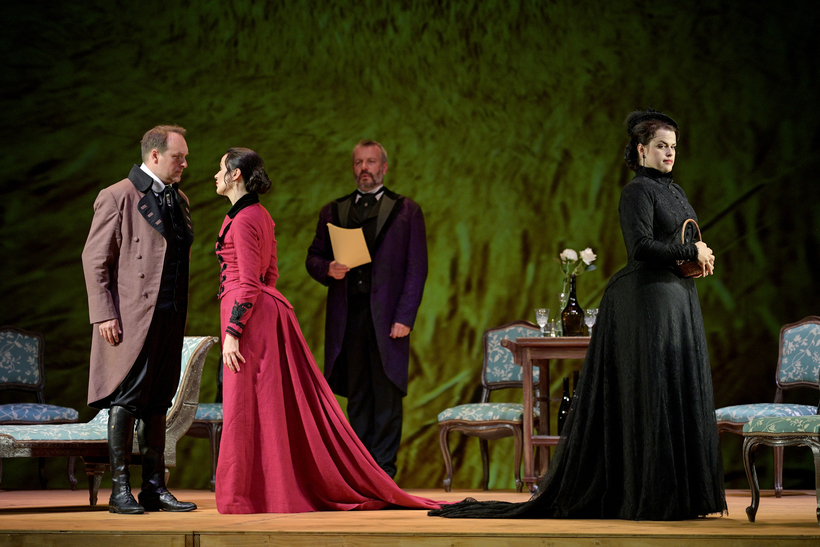At a guess, the 200th birthday of the father of Czech music on March 2 passed you right by. Abroad, Bedřich Smetana owes his name chiefly to the tips of two icebergs. The beloved symphonic travelogue “The Moldau,” conjuring the course of the mighty river best known as the Vlatava, belongs to tone-poem cycle Má Vlast (My Country), which is in six parts. So, there’s one tip. The other is the whirlwind overture to Smetana’s sparkling opera The Bartered Bride, which once flew the Czech flag proudly around the world but has now virtually vanished from view. As for his seven other operas, they have scarcely ever traveled at all.
But back in Ostrava, which is Czechia’s third city, the National Moravian-Silesian Theatre celebrated Smetana’s anniversary in a big way. In May, the company presented all eight of his operas festival-style, attracting 4,000 viewers, including 250 from other countries. Now, The Kiss and The Two Widows which premiered in Prague two years apart in the 1870s, have been released on video, revealing the little tip of a third iceberg. That would be the lovely lullaby from The Kiss, which turned up not too long ago on Renée Fleming’s recital album Guilty Pleasures (2013). Think of the excerpt, if you wish, as a pendant to the ravishing “Song to the Moon” from Dvořák’s operatic fairy tale Rusalka, long a Fleming specialty. Remember, though: Smetana was the father of Czech music; The Kiss predates Rusalka by a quarter century.

Glamorous of feature, lustrous of tone, Ostrava’s prima donna soprano Veronika Rovná dominates both videos in related roles of women too stubborn, scrupulous, or superstitious to grasp happiness that is theirs for the taking. In The Two Widows (filmed in June 2022), Rovná’s the soulful one, coaxed out of mourning by the irrepressible Lada Bočkova as her sister in merry-widow cherry red. (You just might flash on Così fan tutte.) And in The Kiss (filmed in July 2021), Rovná portrays the sweetheart left on the shelf when the parents of the lad she loves forced him into another marriage. Now that his first wife has died young, he’s back, and coming on way too strong. Happily, marriage in old Bohemia is a community affair, and all turns out right for both couples. (It takes a village.) Rovná’s costar, twice over, is the tenor Martin Šrejma—no pinup, but what a serenader!
Faux or folksily naïve as Smetana’s chosen libretti may be, his bewitching tunes, zesty rhythms, and full-blooded orchestrations lend the action satisfying novelistic heft. The operas sweep along like the symphonic waters of “The Moldau,” and not without some surprise twists along the way. As the gamekeeper Mumlal in The Two Widows, the saturnine basso Martin Gurbal takes command in an ace-in-the-hole self-portrait as a grumbler. In The Kiss, a swerve in the plot introduces Josef Kovačič, another basso of note, as the smuggler Matouš, whose voice guides his troops through the night with the muted majesty of an ancient nature spirit. Magically, the chorus amplifies his song, passing by, tree branches in hand, like Birnam Wood en route to Dunsinane.
The Kiss and The Two Widows are available for streaming on YouTube and on the OperaVision platform
Matthew Gurewitsch writes about opera and classical music for AIR MAIL. He lives in Hawaii

